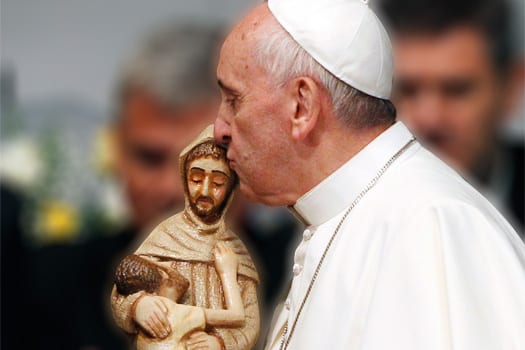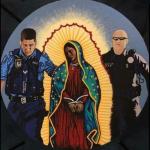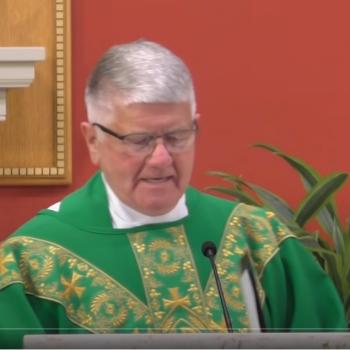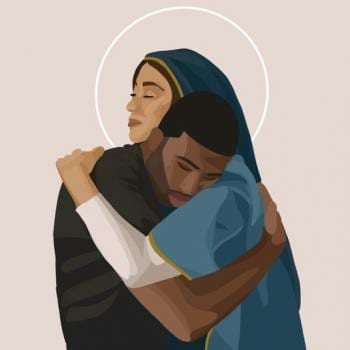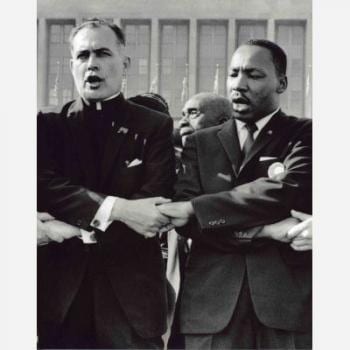While I may be in a distinct minority among American Catholics, my spirits are rising. Unlike many I know, I don’t feel fearful and defensive. Instead, I can feel fresh new winds (buenos aires, so to speak) blowing after the Amazonian Synod.
Somehow, miraculously, we have a pope whose vision of the Church’s hierarchy of problems is very different from that of his two predecessors. As he frequently indicates, Pope Francis is not focused primarily on addressing the Church itself and its internal operations. Instead, he wants the Church to look outwards at the burning planet and the cities full of the dying. And then demonstrate a sense of mercy by opening the largest “field hospital” we can manage.
The very name of Francis stands for another kind of church — simple and poor, open to all, and a great advocate for the earth and all of creation.
Part of this task is to de-paganize the Church. Not by fearful attacks on indigenous theology but by abandoning the Roman imperial style which Pope Gregory VII put into place in 1077, a date the great historian Yves Congar considered to be the greatest revolution in Church history. After a first millennium as a church community, the Church on this date began to resemble a monarchical and absolutist institution.
The scandals in recent years reached such a threshold as to lead to the resignation of Pope Benedict XVI who realized he no longer had the strength to heal them. Does his papacy symbolize the end of this Eurocentric, hierarchical phase of Church history and the beginning of something new?
A key figure in these new winds blowing is that of Leonardo Boff, the Brazilian theologian whose work on uniting integral ecology and a de-Marxified and widened form of liberation theology has been embraced by Pope Francis and others worldwide. On the Church’s troubles, Boff has written,
However bad its historical errors and mistakes have been, the church institution keeps the sacred memory of Jesus and the grammar of the Gospels. The church preaches liberation, knowing that the church itself does not free people; others do that. So it is worth staying in the church, as did Saint Francis, Dom Helder Camara, John XXIII, and the notable theologians who helped make the Second Vatican Council ….
If there is one book which captures the new situation for the Church after the Amazonian Synod, it may be Boff’s Francis of Rome, Francis of Assisi. Why is St. Francis so important in understanding this moment?
First, St. Francis was himself the living antithesis of the imperial church, a layman (he was never ordained a priest) proposing total renunciation, radical poverty, and extreme simplicity. He did not break with Rome but instead led a great revolution “from below,” from the peripheries.
Next, the centrality that St. Francis gave to the poor. As Boff points out, “He did not organize any works for the poor, but he lived with the poor and like the poor.” Pope Francis has noted that the problem of the poor cannot be resolved without the participation of the poor: it cannot be resolved by practicing philanthropy but by social justice.
Finally, St. Francis is the patron of ecology, the paradigm for a respectful kinship with all creatures at a time when life itself — all life — is threatened. He is also closer to indigenous peoples, who feel themselves to be part of nature, than to those whom Boff describes as “the sons and daughters of technical-scientific modernity, who regard nature as wild and at our disposal to be tamed and exploited.”
So what is this Church now arriving, the new ecclesial paradigm which is causing so much apprehension and anger in some, often quite affluent, quarters?
Boff suggests it is “the church as a huge network of Christian communities rooted in different cultures, some more ancient than Western culture, such as China, India, Japan, the tribal cultures of Africa, and the communitarian cultures of Latin America.”
What then has Pope Francis brought us that is really new?
Boff’s reply is a list: from church winter to church spring, from fortress to open house, from pope to bishop of Rome, from doctrine to encounter (a form of Pope John Paul II’s famous personalism), from exclusion to inclusion, from church to world, from the world to the poor.
European Christianity was once a spring of living water, Boff acknowledges. “But that glory made the church so proud that it did not enter into dialogue with the new realities that were arising in history, such as science, technology, nation states, democracies, modern freedoms, human rights, and rights of the poor.” And now that model is in its decline.
We want a church which does not exist for itself but for the world it is called to serve. It cannot be merely a Western phenomenon but must find its place within a new phase of humanity, the planetary phase. It must become, in Boff’s words, “a spiritual hearth again, where it is good to live together, struggle, and celebrate life with others in dialogue, in closeness, tenderness, and love.”

